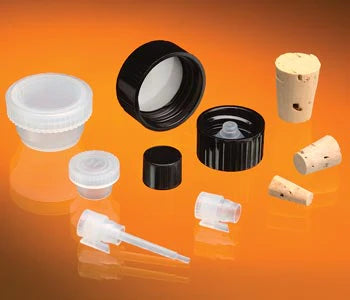
A Comprehensive Guide to Glass Vial Closures
Share
Choosing the right closure for your glass vial is just as important as selecting the vial itself. The right closure ensures your product remains safe, secure, and easy to use. Whether you’re in pharmaceuticals, cosmetics, or health and wellness, having the appropriate vial closure can significantly impact product integrity and user experience. Let’s take a closer look at the most common vial closures and their benefits.
1. Tamper-Evident Closures
Tamper-evident closures are essential for industries where product safety and security are a top priority—particularly in pharmaceuticals. These closures provide visible evidence if the vial has been opened or tampered with, ensuring customers can trust that the product hasn’t been compromised.
Benefits:
- Adds an extra layer of security, especially for medications and supplements.
- Provides peace of mind for both businesses and consumers.
- Helps maintain compliance with regulatory standards for product safety.
2. Polyseal Caps
Polyseal caps are widely used in various industries due to their versatility and ability to form a tight, secure seal. These caps are made from polyethylene, which conforms to the vial’s finish, creating a snug fit. Polyseal caps are especially popular for products that require an airtight seal, such as essential oils or volatile liquids.
Benefits:
- Creates a secure, leak-proof seal that protects against evaporation and contamination.
- Ideal for products that need to be kept fresh, such as fragrances or chemicals.
- Provides excellent compatibility with glass vials of various sizes.
3. Phenolic Caps
Phenolic caps are made from a tough, heat-resistant material known as phenolic resin. These closures are highly durable and ideal for products that need extra protection against high temperatures, moisture, and chemicals. They’re a common choice in both laboratory and industrial settings.
Benefits:
- Resistant to heat, making them perfect for products stored in extreme temperatures.
- Provides excellent chemical resistance, making them ideal for aggressive substances.
- Highly durable, ensuring the integrity of your product in challenging environments.
4. Screw-Thread Caps
Screw-thread caps are a standard option for many industries, offering simplicity and reliability. These closures screw directly onto the vial, providing a tight, secure seal that prevents leakage and contamination. Screw-thread caps are available in a range of materials, including plastic and metal, allowing for customization based on product needs.
Benefits:
- Easy to use, providing a simple, reliable seal for various products.
- Available in different materials, including tamper-evident options.
- Ideal for a wide range of applications, from pharmaceuticals to cosmetics.
5. Orifice Reducers
For products that require controlled dispensing, orifice reducers are the perfect solution. These are typically used with liquids, such as essential oils or serums, where users need to dispense small, measured amounts of the product.
Benefits:
- Allows for precise control over product dispensing.
- Reduces product waste by limiting the flow of liquid.
- Ideal for products that require careful application, such as essential oils or fragrances.
6. Dropper Caps
Dropper caps are commonly used for products that need to be dispensed in small, controlled amounts, such as tinctures, serums, and medicines. These closures come with a built-in dropper, allowing for easy and precise application.
Benefits:
- Provides precise control for liquid products.
- Ideal for pharmaceuticals, skincare, and wellness products.
- Enhances user experience by making application simple and accurate.
Conclusion
Choosing the right glass vial closure is crucial for ensuring your product’s safety, integrity, and ease of use. Whether you need tamper-evident security, an airtight seal, or controlled dispensing, there’s a closure option that meets your needs. By selecting the appropriate closure for your vial, you can protect your product, enhance its functionality, and ensure a positive customer experience.
